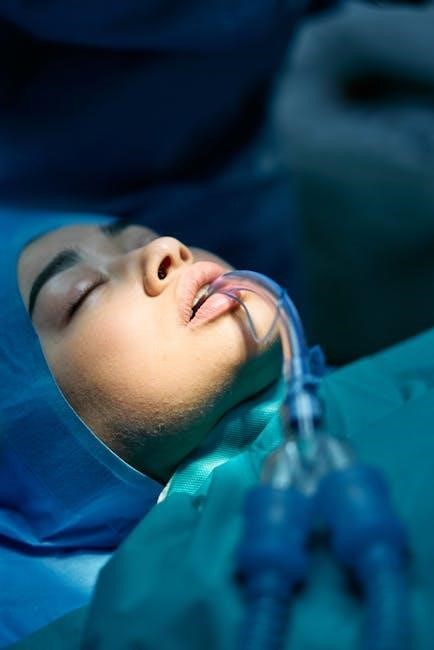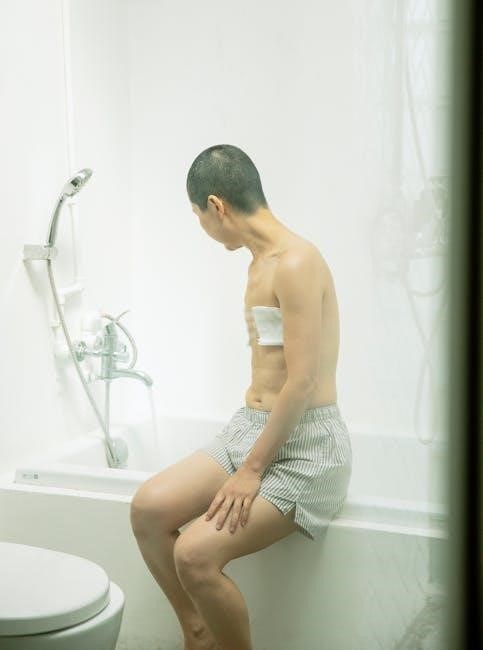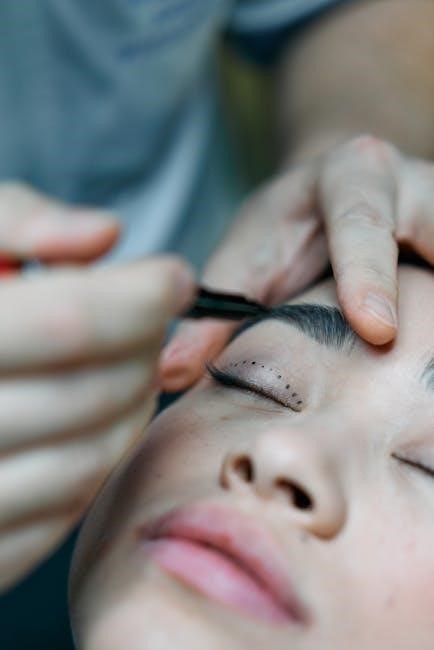lasik eye surgery post op instructions
Immediate Post-Operative Care
Rest your eyes thoroughly for the first 24-48 hours. Avoid screens‚ reading‚ and driving. Wear protective shields‚ especially while sleeping. Keep the room dimly lit. Use prescribed drops and nap upon returning home.
- Resting eyes: Essential for healing.
- Protective shields: Prevent accidental rubbing.
- Dark environment: Reduces discomfort.
- Eye drops: Follow the prescribed schedule.
Resting Your Eyes
Resting your eyes is crucial immediately after LASIK surgery. Avoid screens‚ reading‚ and activities that strain your eyes for 24-48 hours. Keep your eyes closed for 1-2 hours post-surgery to allow healing. A dark room can reduce discomfort. Refrain from watching TV‚ using computers‚ or reading to minimize strain. This period allows your eyes to recover without interference; Taking a nap can help speed up the healing process. Avoid rubbing your eyes‚ as this can dislodge the protective flap created during surgery. Proper rest ensures optimal healing and reduces the risk of complications.
- Avoid screens and reading for 24-48 hours.
- Keep eyes closed for 1-2 hours post-surgery.
- Rest in a dark room to minimize discomfort.
- Refrain from activities that strain the eyes.
Wearing Protective Eye Shields
Wearing protective eye shields is essential after LASIK surgery to prevent accidental rubbing or trauma. Use the provided shields‚ especially while sleeping‚ for the first 24-48 hours. Remove them only when applying drops or washing. Shields protect the delicate corneal flap created during surgery. Avoiding direct pressure or impact ensures proper healing. Sunglasses are also recommended outdoors to shield eyes from UV light and debris. Proper use of shields minimizes risks of complications and supports recovery. Always follow your surgeon’s specific instructions regarding shield usage and care.
- Wear shields‚ especially during sleep‚ for 24-48 hours.
- Remove only for drops or washing.
- Protects the corneal flap from damage.
- Use sunglasses outdoors for added protection.
Avoiding Screens and Reading
After LASIK‚ avoid screens‚ reading‚ and other visually demanding activities for 24-48 hours. This reduces eye strain and promotes healing. Resting your eyes helps prevent dryness and discomfort. Avoid watching TV‚ using computers‚ or reading books. Instead‚ listen to music‚ take naps‚ or relax in a dimly lit room. Minimize screen time to allow your eyes to recover fully. Prolonged screen exposure can slow healing and increase irritation. Follow your surgeon’s guidance to ensure optimal recovery and minimize complications.
- Avoid screens for 24-48 hours post-surgery.
- Rest eyes to reduce strain and discomfort.
- Minimize activities that stress the eyes.

Protecting Your Eyes
Wear goggles or shields to prevent trauma. Use sunglasses outdoors and avoid dusty environments. Keep eyes moist with prescribed drops to aid healing and reduce irritation.
- Wear protective gear: Safeguard against accidental injury.
- Sunglasses outdoors: Protect from UV light.
- Moisturize eyes: Essential for healing and comfort.
- Artificial tears: Use as directed to keep eyes moist.
- Protective shields: Prevent accidental rubbing during sleep.
- Avoid irritants: Stay away from dust and smoke.
- UV protection: Essential for preventing damage.
- Glare reduction: Enhances visual comfort.
- Consistency: Key to proper healing.
- Swimming and hot tubs: Avoid for one month.
- Showering: Keep eyes closed.
- Preventing infection: Essential for healing.
- Strenuous activities: Avoid for one week.
- Contact sports: Prevent accidental eye injury.
- Avoid heavy lifting or bending.
- Refrain from high-impact exercises.
- Limit physical strain to prevent eye pressure spikes.
- Avoid sports with direct eye contact risks.
- Use protective eyewear if sports are necessary.
- Consult your doctor before resuming activities.
- Avoid makeup: For at least 5 days after surgery.
- Gentle removal: No pressure on the eyes.
- Follow guidelines: Ensure safe and hygienic practices.
- Avoid eye makeup for 5 days post-surgery.
- Remove makeup gently without pressure.
- Use clean‚ new products after clearance.
- Scheduled visits: Essential for monitoring.
- Healing assessment: Ensures proper recovery.
- Monitoring progress: Ensures healing is on track.
- Addressing concerns: Early detection of issues.
- Customized care: Tailored to your needs.
- Corneal health: Ensuring proper healing.
- Vision clarity: Tracking improvement.
- Adjustments: Tailoring care for best outcomes.
- Use as directed by your surgeon.
- Acetaminophen is generally recommended.
- Avoid NSAIDs unless approved.
- Rest and recovery are key.
- Use artificial tears as directed.
- Do not rub your eyes‚ even if they itch.
- Monitor and report persistent irritation.
Preventing Eye Rubbing
Avoid rubbing your eyes for at least 3 months post-surgery to prevent dislodging the corneal flap. Use artificial tears to soothe dryness and irritation. Wear protective shields‚ especially while sleeping‚ to minimize accidental rubbing. Refrain from activities that may cause eye irritation‚ such as exposure to dust or smoke. If your eyes itch‚ consult your doctor before taking any action. Proper care ensures the cornea heals correctly‚ minimizing complications and promoting clear vision recovery.
Wearing Sunglasses
Wear sunglasses outdoors for the first few weeks to protect your eyes from UV exposure and reduce glare. Choose sunglasses with 100% UV protection to prevent irritation and promote healing. Avoid trendy sunglasses without UV protection‚ as they may not offer adequate defense. Consistent use of sunglasses helps prevent complications and ensures optimal recovery. This precaution is crucial during the healing process to safeguard your vision and comfort.
Avoiding Water Exposure
Avoid exposing your eyes to water for at least one month post-surgery. Refrain from swimming‚ using hot tubs‚ or submerging your face in water. When showering‚ keep your eyes closed to prevent soap or water from entering. Avoid getting water directly in your eyes‚ as this can increase the risk of infection. Use clean‚ dry towels to pat your face dry. This precaution is vital during the healing phase to prevent complications and ensure proper recovery. Follow these guidelines strictly to protect your eyes and maintain optimal vision outcomes.
Activity Restrictions
Avoid strenuous activities for the first week post-surgery. Refrain from contact sports and caring for small children to minimize eye trauma risk. Use protective eyewear when necessary.
Avoiding Strenuous Activities
Avoid heavy lifting‚ bending‚ or strenuous exercises for at least one week after LASIK surgery. These activities can increase eye pressure‚ risking dislodgment of the corneal flap. Refrain from high-impact workouts or sports that may jar the eyes. Even light activities like yoga or stretching should be approached cautiously to avoid strain. Avoid activities that raise intraocular pressure‚ as this could delay healing or cause complications. Stick to light walking or relaxation during the initial recovery period. Adhering to these restrictions ensures proper healing and minimizes risks associated with post-LASIK recovery.
Refraining from Contact Sports
Avoid contact sports for several weeks after LASIK surgery to protect your eyes from potential trauma. Activities like football‚ boxing‚ or martial arts pose a high risk of eye injury‚ which could dislodge the corneal flap or cause complications. Even minor impacts can disrupt the healing process. If sports are unavoidable‚ consult your doctor about protective eyewear. However‚ it’s best to avoid such activities entirely for at least 4-6 weeks. Protecting your eyes ensures proper healing and minimizes the risk of long-term vision issues. Always prioritize eye safety during recovery.

Medication and Eye Drops
Use prescribed eye drops as directed. Apply one to two drops in the operative eye(s) four times daily for one week. Manage dry eyes to aid healing.
Using Prescribed Eye Drops
Use prescribed eye drops as directed to promote healing and prevent infection. Typically‚ apply 1-2 drops in the operative eye(s) 4 times daily for 1 week. Gently pull the lower lid to form a pocket‚ then drop the medication without touching the tip to your eye. Do not rinse or share drops. If using multiple drops‚ wait 5 minutes between types. Record usage to ensure consistency. Store drops in a cool‚ dry place and discard unused portions after the specified period to maintain potency and safety.
Managing Dry Eyes
Post-LASIK‚ dry eyes are common‚ especially in the first few weeks. Use lubricating drops frequently to keep eyes moist. Apply drops every 2-4 hours‚ even if eyes feel fine. Avoid rubbing‚ as it can worsen dryness. If severe dryness persists‚ your doctor may recommend punctal plugs or serum tears. Increase humidity at home and avoid direct airflows. Extended screen time and windy environments can exacerbate dryness‚ so limit exposure. Proper hydration also aids healing. Notify your doctor if dryness causes discomfort or vision issues‚ as this may require additional treatment to ensure proper recovery and prevent complications.
Hygiene and Makeup
Avoid eye makeup for 5 days post-surgery. When removing makeup‚ avoid pressure on the eyes. Use gentle products and follow your doctor’s guidance for safe application.
Avoiding Eye Makeup
Refrain from using eye makeup‚ including mascara and eyeliner‚ for at least 5 days after LASIK surgery. When removing makeup‚ avoid applying pressure to the eyes. Gently clean the area without touching the surgical site. This precaution minimizes the risk of infection or disrupting the healing process. Avoid sharing makeup or using expired products to ensure hygiene. Wait for your doctor’s approval before resuming eye makeup to prevent complications.


Follow-Up Care
Attend all scheduled post-operative visits to monitor healing and address concerns. Follow-ups ensure proper recovery and allow your doctor to assess progress and provide guidance.
Importance of Post-Operative Visits
Post-operative visits are crucial for ensuring proper healing and addressing any complications. These visits allow your surgeon to monitor the progress of your vision correction‚ check for any signs of infection or dryness‚ and adjust treatment as needed. Regular follow-ups help prevent potential issues and ensure the best possible outcome. Missing these appointments can hinder recovery and affect long-term results. Your surgeon will assess the healing of the cornea‚ measure visual acuity‚ and provide personalized advice to support your recovery journey.
Monitoring Healing Progress
Monitoring healing progress is vital to ensure the success of LASIK surgery. Regular follow-up appointments with your surgeon allow for thorough examinations of the cornea and overall eye health. During these visits‚ your doctor will check for clarity‚ dryness‚ and any signs of complications. Early detection of issues like inflammation or improper healing can be addressed promptly‚ preventing long-term vision problems. Your surgeon will also assess how well your vision is improving and provide guidance on any necessary adjustments to your care routine. Consistent monitoring ensures a smooth recovery and optimal visual results.


Pain and Discomfort Management
After LASIK‚ eyes may feel scratchy or uncomfortable. Use prescribed drops to ease dryness and irritation. Over-the-counter pain relievers like acetaminophen can help manage discomfort‚ which typically subsides within a few days. Avoid rubbing your eyes to prevent complications and ensure proper healing. Follow your surgeon’s advice for managing any post-operative discomfort effectively.
Using Over-the-Counter Pain Relief
Over-the-counter pain relievers like acetaminophen can help manage mild discomfort or irritation after LASIK surgery. These medications are safe to use as directed and can alleviate dryness or scratchiness. However‚ avoid using NSAIDs like ibuprofen without consulting your doctor‚ as they may slow healing. Always follow the recommended dosage and instructions provided by your surgeon. Pain relief is typically needed for a short period‚ as discomfort usually subsides within a few days. Prioritize rest and avoid strenuous activities during this time to support healing and minimize the need for additional pain management.
Managing Eye Irritation
After LASIK surgery‚ eye irritation is common due to dryness or discomfort. Use artificial tears frequently to keep your eyes lubricated and soothe irritation. Avoid rubbing your eyes‚ as this can dislodge the corneal flap or cause complications. If irritation persists‚ consult your surgeon for additional solutions. Patience is key‚ as mild irritation typically subsides within a few days. Follow your surgeon’s advice for managing discomfort and promoting healing.
Leave a Reply